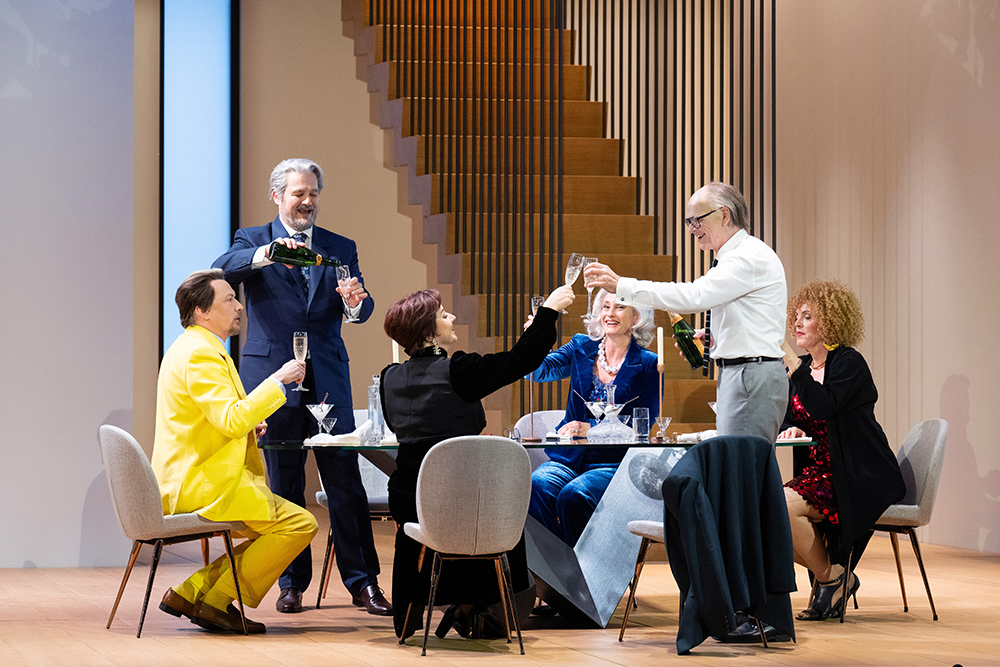Aix is an odd place. It should be charming, with its dishevelled squares, Busby Berkeley-esque fountains, pretty ochres and pinks. Yet none of it feels quite real. It’s as if an AI bot had been asked to design a Provençale city. Everything is suspiciously perfect. And then you notice all the Irish pubs and American student clones. It’s the prettiness of a Wes Anderson set – with the charm of an airport. In this uncanny valley, however, lies what continues to be one of the world’s classiest opera festivals.
The major new commissions this year were two British chamber operas. George Benjamin and Martin Crimp were returning with Picture A Day Like This, their third collaboration for Aix. It’s another medievalish fable, a quest: a mother has lost her son and must find someone truly happy in order to revive him. She hunts down one charmed archetype after another – lovers, artisan, art collector, gardener, composer – and in each case discovers that life’s not so rosy. It’s a circling, see-sawing narrative – plotting alla rondo – that becomes predictable quite quickly.
It was possibly the cruellest Cosi I’ve ever seen –but also the most real
Benjamin is clearly happier, and compositionally more interesting, when in destruction mode, and conducts those passages where musically he has to bash in the windows – fast-bowling clarinets or brass through panes of sound – with relish. Much less convincing is his attempt to paint bliss – though the wobbling eddies on recorder come close. As always with Crimp and Benjamin we’re missing something. A convincing foundation. A generosity of expression. The result is that the opera’s climaxes never felt earned, despite the vocal generosity of the mother Marianne Crebassa.
The other new chamber work, The Faggots and Their Friends Between Revolutions, by Philip Venables and Ted Huffman, a musical lecture on queer history, was far less precious but no less flawed, melding experimental, pell-mell theatricality – musicians and singers all mucking in – with found bits of folk and the Gebrauchsmusik style of Eisler and Brecht. It’s unrelenting and virtuosic in the ensemble work, but also suffocatingly didactic. That said, it’s bold of the cast to denounce gay marriage and queers joining the military, and to suggest everything was much more fun when things were illegal.
One of the major draws of the Aix programme is its focus on the few directors who actually matter – Castellucci, Warlikowski, Simon McBurney, Dmitri Tcherniakov – most of whom British companies tend to ignore. Directing Wozzeck, McBurney seemed a little hemmed in. He suits a blank slate far better, where his full Complicité vision can stretch its legs. Only once things unravel for Wozzeck (a diffident, miscast Christian Gerhaher) and society starts circling was McBurney able to finally flex his theatrical muscles and tighten the noose. In the pit, Simon Rattle and the London Symphony Orchestra fanned the flames of the music with satanic intent.
Tcherniakov’s Cosi fan tutte was fascinating. Set exclusively in a modern hunting lodge designed in international wanker style, all glassy and grey, this at first seemed unlikely. But come the wager, it was clear that the director was about to attempt a high-wire act. Instead of allowing the battle of the sexes to play out in disguise, Tcherniakov presents the test of female fidelity as an open bet between swinging couples, who proceed to larp the next two hours of plot. It’s Cosi Through The Looking Glass: every serious line becoming sarcastic, every moment of tenderness a bit of mischief. ‘My heart is breaking,’ the women joked, sad-facing as the men feigned conscription.
It’s a thick conceptual blanket that had the potential to completely disfigure the opera. And by the end, it did. But it was amazing to watch Tcherniakov shrink-wrap aria after aria and, for a while, produce pure magic, as the new subtexts prised open the music and characters. It was possibly the cruellest Cosi I’ve ever seen – but also the most real.
It was also quite brilliant. Until of course it wasn’t. No all-embracing concept like this can ever deliver a wrinkle-free surface. But Tcherniakov pushed it well beyond breaking point, turning Don Alfonso (Georg Nigl) and Despina (Nicole Chevalier) into gun-toting, bisexual pyschopaths. Er, right-oh. At least it focused the opera on what were by far the two best instruments in the house – both voices so creamy, flexible and spontaneous.
All these works took place within the various handsome theatres in Aix itself. Out in the middle of literally nowhere, halfway to Marseille, in a huge hangar that doubled as a very effective oven, the festival also presented three new films to accompany Stravinsky’s three great Ballets Russes works, The Firebird, Petrushka and The Rite of Spring. The least memorable element turned out to be the conducting of much-hyped 27-year-old conductor Klaus Makela. The Orchestre de Paris is a scrappy beast and Makela hadn’t drilled the musicians. In fact very little of the hard work of pacing or balancing had been engaged. As we might expect of a kid his age, he’d gone instead for the easy wins: heightening weird textures, exaggerating climaxes, emphasising extremities. He was anyway being overshadowed by Bertrand Mandico’s take on Petrushka. Mandico’s wild, punkish film – a nod to the surreal 70s sci-fi of Ulrike Ottinger – culminates in a bunch of sexy Asian female cops in red lipstick and leather bikinis bludgeoning some half-naked anorexic models to death with human bones. It was a total hoot, and briefly allowed me to forget I was being cooked alive in the middle of the French countryside with no way home.






Comments